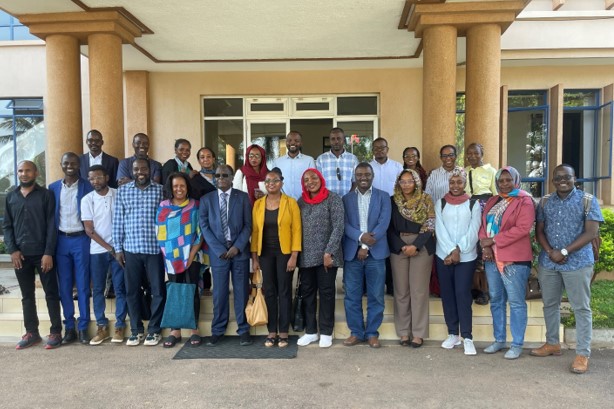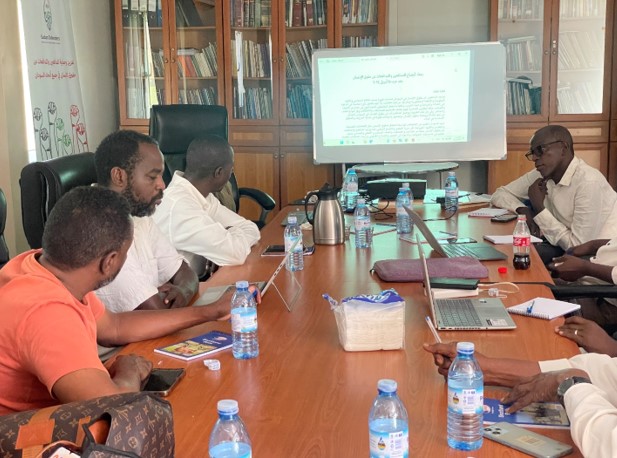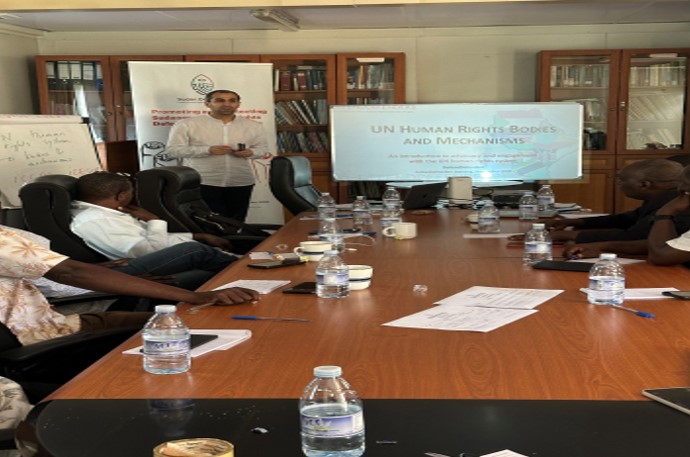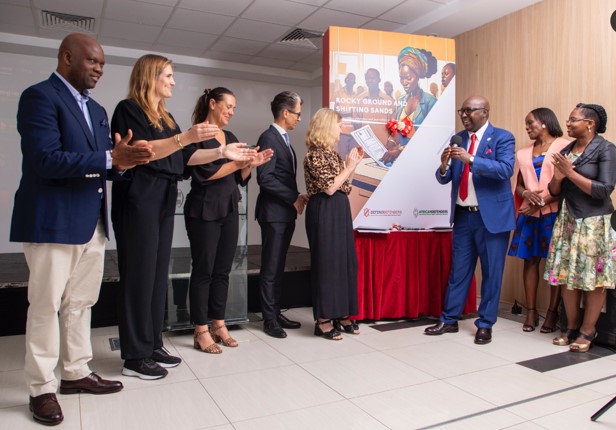November and December 2024 Newsletter

Executive Summary
Greetings from Sudan Defenders!
In the month of December, as SudanDefenders we congratulate the women in Sudan for commemorating the 16 day UN campaign against Gender Based Violence. This has come in a time when Women HRDs and women in Sudan are victims of systematic violence against them and we call for a stop to this. We also call on international and national organisations to provide support to DefendDefenders to provide protection of Women HRDs who are on the frontline.
We call for both warring parties to stop violence against women and children so as to bring a ceasefire to the conflict in Sudan that has a devastating impact on their lives and properties of civilians. The famine in South Darfur, East Darfur areas of Khartoum and South Kordofan is critical and there is a lack of food and medical aid.
The SudanDefenders Human Rights Coalition is making preparations for the General Assembly in January and we call on coalition members and Civil Society Organisations to follow our social media platforms to stay updated or inquire at our email [email protected]
We wish the best regards for the new executive committee that will take over after the General Assembly. This will be the 3rd election which is in line with the democratic nature of the coalition. We will be available to help the new committee to help them transition
Our latest issue highlights the story of Muzamil Al-Ghaly a human rights defender from Sudan. Despite the ongoing violence and attacks from both the state and the armed factions, Muzamil Al-Ghaly remains determined to make the most of the terrible situation. His story serves as a powerful reminder of the resilience and courage of those fighting for justice in Sudan’s most challenging conditions.
I invite you to read our November and December Newsletter.
Adam Musa Obama
Executive Director
Updates on Sudan
Highlights with infographics
SudanDefenders offered support in the form of training and meetings to 31 HRDs in the months of November and December who are in exile.
According to the Ministry of Health of Sudan, 186,000 doses of malaria vaccines have been administered.
According to the World Food Program, over 700 trucks carrying 17,500 tonnes of food, enough to feed 1.5 million people for a month, are en route to communities nationwide, including 14 high-risk hotspots.
Humanitarian Impact( Sickness, famine, diseases)
On 10 November 2024, Sudanese Armed Forces’ aircraft bombed Saraf Omra with two explosive barrels. The bombardment focused on the southwest area of the livestock market, which was crowded with civilians, and a second strike occurred near Saraf Omra Hospital, causing shrapnel to strike the hospital’s operating room and other departments, resulting in significant damage, including a collapsed roof.
The severe case of malnutrition in Omdurman has led to the death of at least 20 people, including 8 children. Omdurman is currently on hold at the RSF.
A malaria outbreak in Sudan’s East Gedaref state recorded over 5000 cases in one week. This prompted the Ministry of Health to launch a vaccination campaign on 4th November, targeting 15 areas in Gedaref and the Blue Nile region. The campaign has administered 186,000 doses of the vaccine so far.
On November 19, 2024, the town of Al-Kuma in North Darfur State was subjected to an airstrike carried out by the Sudanese Army’s air force. The attack resulted in the complete destruction of the town’s remaining market, claiming the lives of five individuals and leaving two children severely injured.
On 29 November, the RSF announced the formation of a civilian administration in Khartoum state. The RSF said that its “Civilian Founding Council of Khartoum State” elected Nayel Babiker Nayel as chairman and Abdel Latif Al-Amin Al Hassan as head of the civilian administration.
Close to 120,000 individuals have sought refuge in Uganda, including a heavy influx of Sudanese, who account for more than a third of the new arrivals in Kiryandongo. At the refugee settlement, refugees receive humanitarian assistance, including food, shelter and health care.
On 28 November, the Sudan Health Ministry reported that cholera cases had surged past 43,000, with more than 1,100 deaths since August 2024. The Ministry reported 221 cases and two deaths on Thursday, bringing the total to 43,490 cases and 1,187 deaths across 11 states.
On 6 December, 7 people were killed after an airstrike on a mosque in the Shambat district of Khartoum Bahri. The Emergency Lawyers, a human rights group, said in a statement that the “Sheikh Ahmed al-Siddiq Mosque in the Shambat neighbourhood of Bahri was subjected to indiscriminate aerial bombardment after Friday prayers, resulting in the death of seven worshippers and injuring a number of others.”
On 11 December, an airstrike targeted El Sekka Hadid in northern Nyala, killing three people and critically injuring three others. The injured were rushed to the hospital for medical treatment. The SAF also reportedly targeted a house in El Jumhuriya, near the Nyala Museum, terrifying residents.
Human Rights Violations (aerial bomabardments, attacks)
On 8 November 2024, IDP Abdelqader Abdelrazek Hassan Abdelkarim (aged 24) was killed in Mokjar Camp – Crofta Neighborhood after being intercepted by armed assailants on motorcycles while returning from Friday prayers. When he refused to hand over his bag, he was shot dead.
On 9 November 2024, IDP Isaac Dowalbeit Mohamed (aged 22) was killed in Kalma Camp – Center 7 after being shot by armed militias south of the camp.
In Shangil Tobay camps, armed forces have abducted young men, subjecting them to torture and coercing many into forced recruitment under threats.
On 16 November 2024, forces affiliated with the Rapid Support Forces (RSF) arbitrarily arrested the Secretary-General of the IDPs Coordination Committee at Kassab Camp, Mr. Ibrahim Adam Mohammed Juma. an RSF unit comprising two military vehicles, led by Ibrahim Abdullah Ibrahim (commonly known as “Arabi Kiro”), raided a meeting of the IDPs Coordination Committee leadership at Kassab Camp.
On 12 December, Yasser Ali Mohammed Al-Hassan was killed amid widespread arrest campaigns that included civilians and former military personnel. He had been detained for more than a month as a result of torture in the prisons of forces in the city of Nyala, the capital of South Darfur State.
Relief Efforts
On 14 November 2024, World Food Program’s deputy country director in Sudan, Alex Marianelli, called for the safe passage of two aid convoys in Sudan. He said that one convoy was destined for Zamzam camp in North Darfur, aiming to provide food assistance to 27,000 people. The other would deliver aid to Delling and Kadugli, the state capital of South Kordofan, to feed 10,000 people.
On 23 November 2024, The Darfur Victims Support Organization, in collaboration with the Save Al-Geneina Initiative, successfully provided much-needed assistance to displaced persons at Sabreen Camp in Ed Daein. These baskets included essential food supplies such as sorghum, rice, sugar, oil, soap, and premium wheat flour.
On 29 November 2024, the first World Food Programme (WFP) convoy arrived at Zamzam camp in North Darfur since the declaration of famine in the area three months ago. The statement also reported that over 700 trucks, carrying 17,500 tonnes of food, enough to feed 1.5 million people for a month, are en route to communities nationwide, including 14 high-risk hotspots.
Advocacy and Policy
On 19 November 2024, the United Nations Security Council failed to adopt a draft resolution urging measures to protect civilians in Sudan after Russia used its veto power to reject it. The draft resolution condemns the ongoing attacks by the RSF on El Fasher, the capital of North Darfur. It demands that the paramilitary group immediately cease all attacks against civilians in Darfur, El Gezira, Sennar, and elsewhere in Sudan. This includes refraining from using civilians as human shields.
On 19 November 2024, The US Special Envoy for Sudan, Tom Perriello, pointed out that in his meetings with Sudanese stakeholders, namely Sudan’s Sovereignty Council Chairman, Lt Gen Abdelfattah El Burhan, his deputy Malik Agar, civil society leaders, and United Nations humanitarian team officials in Port Sudan clarified that “people want the urgency of making sure food and medicine is reaching folks, wanting to make sure this war comes to an end and get back on the path to civilian government, and in terms of results in recent weeks and confirmed yesterday, we now have multiple routes in for food and medicine from Port Sudan.
On 25 November 2024, in commemoration of the International Day for the Elimination of Violence Against Women, which aims to raise awareness and combat violence against women and girls, women organisations in Sudan called on Sudanese women to raise their voices against war and advocate for peace as a global 16-day campaign to combat gender-based violence begins.
On 24 November 2024, in a statement to coincide with the International Day for the Elimination of Violence Against Women on 25 November*, which marked the launch of the UNiTE campaign, an initiative of 16 days of activism to end all violence against women, the Swedish Ambassador and Special Envoy to Sudan, Anna Block Mazoyer, assured the women of Sudan – who have been bearing the brunt of the ongoing humanitarian catastrophe – that “the Swedish government and many others in the international community stand in solidarity with you…”
Clementine Nkweta- Salami, the Assistant Secretary-General, Resident and Humanitarian Coordinator in Sudan, commemorated the end of the 16 days of activism against Gender-Based Violence by assuring the women of Sudan that they stand in solidarity with them.
Updates on Support provided to HRDs by DefendDefenders and SudanDefenders/ Engagements
Actions by SudanDefenders
Review of Research by SudanDefenders on the situation of HRDs in Sudan and in exile.

On 9 November, the board and executive committee of SudanDefenders held a meeting to review the research report that compiled the findings on the situation of HRDs in Sudan and in exile in different countries, namely Chad, South Sudan, Egypt, Uganda, Kenya, and Ethiopia. One member, Eltigani Abdelrahman, was selected to review and implement the points they had discussed.
UN Human Rights Bodies and Mechanisms training.

On 20 November 2024, a UN Human Rights Bodies and Mechanisms training meeting for coalition members was held. There were 21 people present: 4 females and 17 males.
The facilitator educated the team on the UN’s different bodies, composition, and governance.
The discussion covered:
1. The UN Security Council (UNSC)
2. The UN General Assembly (UNGA)
3. The Economic and Social Council (ECOSOC) and other principal organs of the UN
4. The UN Secretariat and Office of the UN High Commissioner for Human Rights (OHCHR)
5. The “United Nations family,” UN agencies, peace operations, UN Country Teams
6. The UN Human Rights Council (HRC) and its bodies and mechanisms
7. The Universal Periodic Review (UPR)
Consultative meeting held of Swedish International Development Cooperation Agency (SIDA), DefendDefenders and SudanDefenders

A consultative meeting was held between SIDA, DefendDefenders and SudanDefenders coalition members. The meeting had 28 people, 10 females and 18 males, representing different Sudanese civil society organisations. This meeting provided different civil society organisations a platform to air their concerns and issues. It shed light on different issues namely access to resources, the lack of cooperation amongst CSOs and the need to work together to offer help to HRDs.

International Human Rights Defenders Day
On 9 December 2024, the SudanDefenders executive and secretariat attended the International Human Rights Defenders Day celebrations held by DefendDefenders.
Through the Eyes of Muzamil Al- Ghaly
Muzamil Al-Ghaly, a legal officer residing in Kampala, has a story that reflects the resilience and struggles of many in Sudan. Originally from El Fasher, North Darfur, he has lived through the tumultuous circumstances of conflict that have reshaped his life and those of his loved ones.
When the war erupted, Muzamil’s family of seven was forced to flee their home in El Fasher, finding refuge in the nearby town of Tawilla. The conditions there are dire. “There is no healthcare and food,” he shares. The lack of access to physical cash has made survival even harder; the family relies on the Bankak app, which deducts a significant portion of any transfer. Communication with his family is extremely limited, as Tawilla lacks internet, compelling Muzamil to wait for intermittent contact whenever they can access Starlink.
Despite these challenges, Muzamil found support through SudanDefenders (DD) under Darfur Victims Support. The organization assisted with office setup, providing furniture and essential staff training, which has been instrumental in helping the organization start strong. “It helped the organization set off on the right foot,” he notes.
The conflict has brought personal tragedy to Muzamil’s life. He recalls a harrowing story of a friend who spent three days hiding under a bed, and the heartbreak of losing classmates to the violence in El Fasher. Tragically, he also lost his aunt and child to a bombing by the Rapid Support Forces (RSF). Such experiences have left profound scars but also a sense of community among those who have endured similar pain.
The effects of the conflict are not isolated to individual tragedies; the entire community is grappling with severe shortages of food and medical care, living in constantly insecure conditions. Many have been displaced to Tawilla, desperately seeking refuge.
The most pressing needs are clear: “They want the war to stop so that they can go home. In the meantime, they need healthcare, food, and safety,” Muzamil emphasizes.
Muzamil has a poignant message for those outside Sudan who may not fully understand the situation: “For them to provide support to Sudan and work together to stop the war.” His call to action highlights the urgency of international solidarity and assistance.
Despite the overwhelming challenges he faces, Muzamil holds on to hope—the hope that the war will cease, paving the way for healing and support for his country. He envisions a future where peace and stability can return to Sudan, allowing families to reunite and rebuild their lives.
Muzamil’s experience is a testament to the resilience of the human spirit in the face of adversity, and his story is a reminder of the ongoing struggles in Sudan, urging us to listen, understand, and act.
